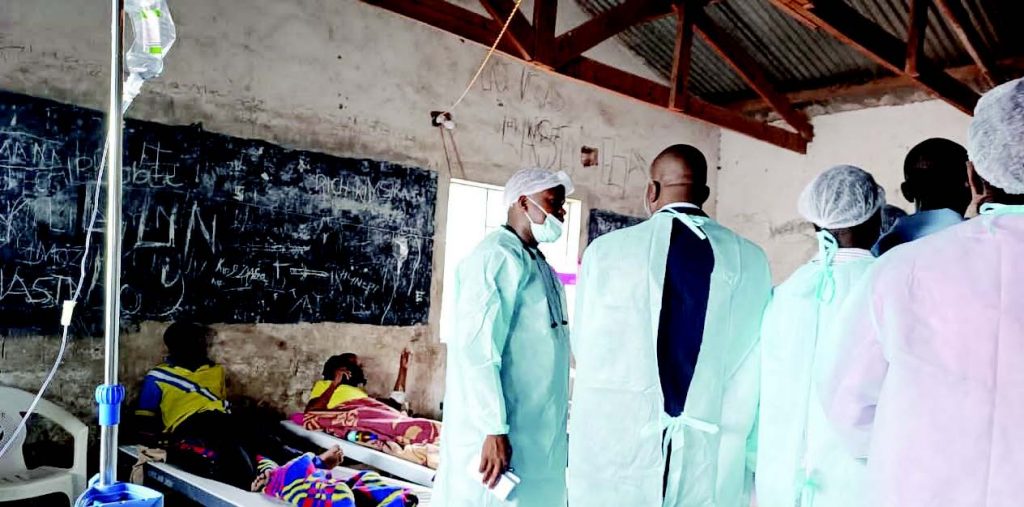At Bangwe Health Centre in Blantyre, 27-year-old Ganizani lies helplessly in a cholera tent with a drip of lingers lactate infusing the essential salts through his arm.
“I suspect that the water in a plastic paper that I drank in the morning could be the cause of my illness. I bought it from a vendor at the market. I rushed to the clinic after experiencing diarrhoea and vomiting. I became so weak,” he says.
Members of the Parliamentary Committee on Health visiting patients in a classroom turned into a ward in Blantyre
From a single case in Machinga on March 3 2022, the cholera outbreak, which has slowly crossed over the off-season, is now infecting on average 570 and killing 18 people a day.
In the other tent, Sarah Seda from Maganga area in the same township is nursing her one-year old child. She said apart from using unsafe water in her area, other factors might be poor waste and improper use of toilets.
At Machinga District Hospital, two tents are full and some patients are lying on the hospital veranda and corridors with drips hanging on veranda bars like ribbons in shops during the festive season.
A cholera patient being treated under a tree due to heat in the tent
The sight of men, women and children lying on bare floor at the hospital portrays a picture of how bad the situation is in the country. Malawi is helplessly struggling to keep pace with the raging outbreak.
Despite President Lazarus Chakwera declaring the outbreak a Public Health Emergency on December 5 2022, the roping in of the Presidential Task Force on Covid-19 to take up the coordination role in the cholera fight and increased support from international partners, the number of cholera cases and deaths keeps soaring, thereby exerting pressure on resources and staff.
Makhetha Clinic in Blantyre stopped attending to other ailments to concentrate on managing cholera cases.
Two cholera tents erected at the clinic and the waiting bay are full with patients; and some are putting up in classrooms of a nearby nursery school, which had suspended its operations following the outbreak.
Clinic-in-charge Precious Kadzinja says they are registering on average 30 cases a day. The clinic had 34 patients in admission when The Nation visited. However, even though there are more than 50 health workers at the clinic, they are overwhelmed.
“We are working 24 hours attending to patients. As of today, the youngest patient is 11 months old,” he says.
But back in the communities, life is normal, they continue to use water from unsafe sources and selling and buying already cooked food despite the ban by local councils.
Elifa Kamenya from Makhetha Township says despite having a tap in her compound, she uses water from a nearby pond and as her tap is always dry and she has no alternative.
“We only access tap water three or five times a month, even the nearby kiosks are always dry. We are forced to use water from unsafe sources because we don’t have a choice,” she said.
Water and Environmental Sanitation Network (Wesnet) executive director Willies Mwandira notes with sadness that the water, sanitation and hygiene sector is not being prioritised for decades, resulting in the current health challenges.
He said: “We urgently and strongly appeal to government to prioritise water supply and accessibility as a central strategy in the national response to the cholera public health emergency.
“For the citizenry to practice proper and thorough hand washing to curb the spread of the disease, there is also a need for all communities and public spaces such as markets and health care facilities to access to clean water and soap. Access to safe water in or near dwellings, markets and healthcare facilities would also further prevent the spread of the diseases especially in over-populated or water-poor areas.”
According to the Ministry of Water and Sanitation, only 89 percent of the Malawians have access to clean water (at basic and limited levels), and there are geographical variations in access to safe water among urban, peri-urban and rural dwellers.
Wesnet recommends that the ministry be provided with more resources so that it recruits more staff for continuous monitoring of water points, rehabilitation and maintenance of non-functional boreholes/water sources so that communities are able to access safe and clean water at all times.
In the midst of the outbreak, it has also emerged that myths and beliefs are affecting efforts with some communities refusing to use chlorine, the chemical used to treat water, while some refuse to go to the hospital due to religious beliefs.
Parliamentary Committee on Health chairperson Matthews Ngwale says if the nation is not careful, cholera will not only be seasonal but will run throughout the year.
He said: “The main problem is the water supply. As a nation, we have been neglecting this problem. We have not invested much in providing our people with clean water and they are being forced to draw water from wells that are close to toilets because they have no option.”
Ngwale further called on stakeholders in the cholera fight to learn from successful stories from areas that have managed to reduce cases.
More than 30 000 cases of cholera and 1 000 deaths have been reported since the onset of the outbreak this season in March 2022.
The post When cholera outpaces initiatives first appeared on The Nation Online.
The post When cholera outpaces initiatives appeared first on The Nation Online.
 Moni Malawi
Moni Malawi 

